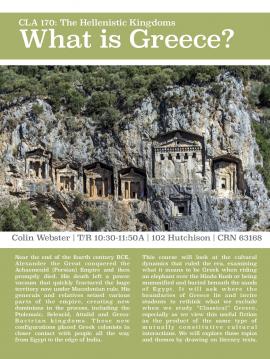 Classics 170. The Hellenistic Kingdoms: What is Greece? (4 units)
Classics 170. The Hellenistic Kingdoms: What is Greece? (4 units)
Colin Webster
Course Description: Near the end of the fourth century BCE, Alexander the Great conquered the Achaemenid (Persian) Empire and then promptly died. His death left a power vacuum that quickly fractured the huge territory now under Macedonian rule. His generals and relatives seized various parts of the empire, creating new dominions in the process, including the Ptolemaic, Seleucid, Attalid and Greco-Bactrian kingdoms. These new configurations placed Greek colonists in closer contact with people all the way from Egypt to the edge of India. The centuries that followed produced new discoveries and novel ways of thinking. The period saw the birth of koine Greek, gnostic Christianity and Hermetic mysticism, as well as developments in astrology, medicine and mechanics, all of which were the result of syncretism and blending. This course will look at the cultural dynamics that ruled the era, examining what it means to be Greek when riding an elephant over the Hindu Kush or being mummified and buried beneath the sands of Egypt. It will ask where the boundaries of Greece lie and invite students to rethink what we exclude when we study “Classical” Greece, especially as we view this useful fiction as the product of the same type of mutually constitutive cultural interactions. We will explore these topics and themes by drawing on literary texts, archaeological and artistic evidence, as well as theories about the nature of culture itself.
Prerequisite: None.
GE credit (New): Arts & Humanities, Visual Literacy, World Cultures and Writing Experience.
Format: Lecture/Discussion - 3 hours; Term Paper.
